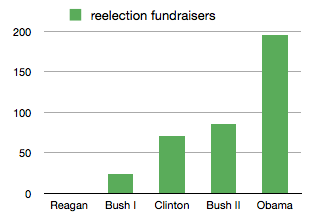It’s hard to read Jane Mayer’s New Yorker piece on campaign fundraising without thinking about how embarrassing and corrupting it is that our system expects the president of the United States to suck up to big shots so he can buy 30-second TV ads on NCIS.
“There’s been no thanks for anyone!” the major Democratic donor says. He adds that in 2008 he gave “multiple millions” to groups working to elect Obama. But, he notes, although he has attended various White House functions, and has met Obama on several occasions, “I don’t think they have a clue who I am. I don’t think they even know how much I gave.” He says that he has been introduced twice to Jarrett, “and neither time did she remember who I am.” Instead, he says, “she seemed to think she was blessing me by breathing in the same space.” Despite repeated pitches, he has not yet given money to Priorities USA. In his view, the Obama White House has not followed the fundamental rule of donor maintenance, which he himself has practiced while fund-raising for other causes: “You have to suck up!” With Obama, he says, “I don’t know if it’s a personality thing, an ego thing, or an intellectual thing. I just don’t get it. But people want to be kissed. They want to be thanked.”
That’s just one of the good anecdotes from Mayer’s fascinating if ultimately not-entirely-convincing look at the Obama campaign’s fundraising, how it’s been upended by the influx of unrestricted donations from billionaires, and why Obama could become “the only sitting President in recent history to be outspent in a campaign.”
This is a sympathetic portrait of an introverted president whose refreshing disdain for Clinton-style glad-handing and donor-stroking has helped threaten his re-election. But the sympathy goes entirely too far, it seems to me. It’s a bit much to have a politician who’s arguably as responsible for the recent escalation in the fundraising arms race as John Roberts, Sheldon Adelson, or the Kochs, portrayed as something of a victim of his own conscience.
Obama, after all, spent far more in the last election than Bush and Kerry had combined just four years earlier. He outspent John McCain a stunning $746 million to $358 million in 2008, and outspent McCain four to one after September 1.
That came after Obama famously, and cynically, broke his promise to accept public financing of his 2008 general campaign (George W. Bush rejected primary matching funds in 2000), becoming the first presidential candidate to reject a cornerstone of campaign-finance reform and making McCain the last to accept it .
This is all we get on that from Mayer:
Obama acknowledges that his record on campaign-finance issues is not entirely pure. In 2008, after championing campaign-finance reform in the Senate, he broke his own pledge to accept public financing as a Presidential candidate, and became instead the first nominee since Watergate to depend entirely on private funds.
Now that the floodgates Obama helped open may swamp his bid for a second term, his team is carping about all the money flooding the system and why their guy’s purity is hamstringing him.
The Obama camp says they didn’t make the system; they just have to play in it, which is true. But let’s not pretend they haven’t played hardball.
For all of his camp’s portrayal of a reluctant fundraiser, and Mayer’s reporting on this is convincing, Obama sure does a lot of it (as she notes). In the last sixteen months, the president has attended about two hundred fundraisers while trying to hold down that day job (meantime, Mitt Romney flies to a foreign country to raise millions, including from a billionaire whose company is under investigation for bribery). This is unprecedented, as you can see from this chart I whipped up of fundraisers by presidents seeking reelection (Obama’s is through July 23 and, yes, Reagan’s number was zero):

A big reason for that frenetic pace is that Obama has alienated billionaires—both by his policies, which have encouraged enormous gifts to Romney, and by his failure to stroke those on his side’s fragile egos, which has discouraged big donations to Obama. She contrasts Obama’s aversion to schmoozing to Bill Clinton’s with a fantastic anecdote from a big Democrat donor:
Hiatt, the former Stride Rite chairman, has witnessed at first hand the difference between Obama and Bill Clinton. In 1996, Hiatt divided half a million dollars among thirty-eight congressional candidates (all of whom were committed to campaign-finance reform). He recalls, “That gave me the dubious distinction of being the second-largest contributor to the Democratic National Committee, which I shuddered at.” In the spring of 1997, he says, President Clinton invited him to a dinner. When he arrived, he found thirty top contributors seated around a table. “It was so vulgar,” he says. “The biggest donors were closest to the President. On his right was Bernard Schwartz, of Loral Corporation, who was later given permission to launch a satellite in China.” (Schwartz, who was cleared of accusations that his donations were improper, says he is “truly sorry” for having given large sums, in indirect gifts, to Democrats—a strategy that he calls “inimical to the well-being of politics in the country.”) After dinner, Hiatt recalls, Clinton “stroked the fat cats,” asking each donor for his thoughts, and obligingly taking notes.
I like to think those notes looked a little something like this:

Anyway, the Loral anecdote there makes it all the more baffling that this gets in the story unchecked:
Creating a sense of intimacy with the President is especially important with Democratic donors, a frustrated Obama fund-raiser argues: “Unlike Republicans, they have no business interest being furthered by the donation—they just like to be involved. So it makes them more needy. It’s like, ‘If you’re not going to deregulate my industry, or lower my taxes, can’t I at least get a picture?’”
I think it’s true that Republican donors have more business interests to further with donations than Democrats—many more—but it’s ridiculous to let an anonymous source assert that Dem donors have no business interests to push when many of them very plainly do. (UPDATE: I erred above in saying that this argument was “unchecked”. Mayer quotes a GOP operative further down in the piece disputing it.)
It’s another example of how this story lets Obama and the Dems off the hook a bit too easy. But nevertheless, this piece is valuable for the spotlight it shines on the soft corruption of how we pay for our elections.
Ryan Chittum is a former Wall Street Journal reporter, and deputy editor of The Audit, CJR’s business section. If you see notable business journalism, give him a heads-up at rc2538@columbia.edu. Follow him on Twitter at @ryanchittum.
